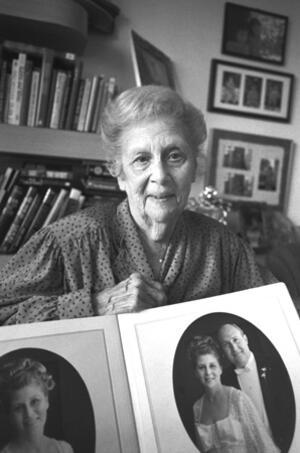Selma Litman
A devoted mother and wife and an influential saleswoman, Selma Litman was born in 1917. Although her father, one of the few Jews in Russia to have gotten a college education, died when she was just 20 months old, Selma was raised on stories that her mother and siblings regularly shared about him. As the youngest girl in the family, Selma was encouraged to pursue a commercial course of studies to prepare her for the work world. After working as a secretary, Selma married her high school sweetheart, Harry Litman, in 1940, and became the leading saleswoman in Sonia's Bridal Shop, her husband's family business. Sonia's provided Baltimore brides from many different ethnic groups with wedding dresses before becoming popular in the Jewish community in the 1960s. A devoted mother to Dana and Jeffrey, Selma balanced working at the store with caring for her children and managing an active household that included frequent entertaining and vibrant Jewish holiday celebrations. Selma Litman passed away on May 25, 2002.
Selma Litman was born on April 1, 1917. She traces her family history. Her father emigrated from Russia to France to the United States in 1904. The family has many heirlooms from Russia, such as a large trunk, candlesticks, dinnerware, and family photographs. He came from a land-owning family, earned a college education in Russia, trained as an engineer, and died during the 1918 influenza epidemic when Selma was a baby. Before his death, Woodrow Wilson invited Selma’s father to accompany him to France as a translator for the Treaty of Versailles, which ended World War I. Selma talks about her mother’s family history, her experiences in Russia with the pogroms, and her immigration to the United States in 1906. Selma describes her childhood memories, her three siblings, the apartment where they lived, and her mother's attempts to support the family after the death of her husband. Selma remembers the grade schools she attended, her Christian friends there, and her experience starring in school plays and performances. She analyzes her family's attitudes towards education and work. Selma was able to attend a school that focused on both academics and secretarial preparation. Both school and work were social opportunities for Selma, and she had many friendships. Growing up, Selma lived in a neighborhood where lots of German Jews settled, and she recalls hearing many pre-Holocaust stories firsthand. Selma has lots of memories around the food her mother prepared, including hot cabbage borscht, homemade noodles, Russian pastries, and making twelve different recipes from one chicken. She remarks that it was important to her parents that the family spoke English. In high school, Selma met her future husband, Harry Litman. She traces Harry's career path and explains how quotas on Jewish students prevented him from attending medical school, so Harry opened a dress shop, Sonia's Bridal Shop, in 1939 to please his mother. Sonia's Bridal Shop provided Baltimore brides from many different ethnic groups with wedding dresses before becoming popular in the Jewish community in the 1960s. Selma was a lead saleswoman at the store. When Selma started her family, she balanced working at the store with caring for her children, Dana and Jeffrey, and managing an active household that included frequent entertaining and vibrant Jewish holiday celebrations. Selma looks back on the significant milestones of her life – getting married, raising her family, buying their first house, and her children's educations. Selma enjoyed her work at the bridal show and the prestige of owning a store but wished she could have spent more time at home with her children. She also discusses the challenges of running a business, including unwanted sexual advances and demanding clientele. Selma and her family belonged to Beth Tfiloh and then Beth-El congregations. Finally, Selma reflects on her career path, the lives of her children, and the strength and importance of her marriage.



